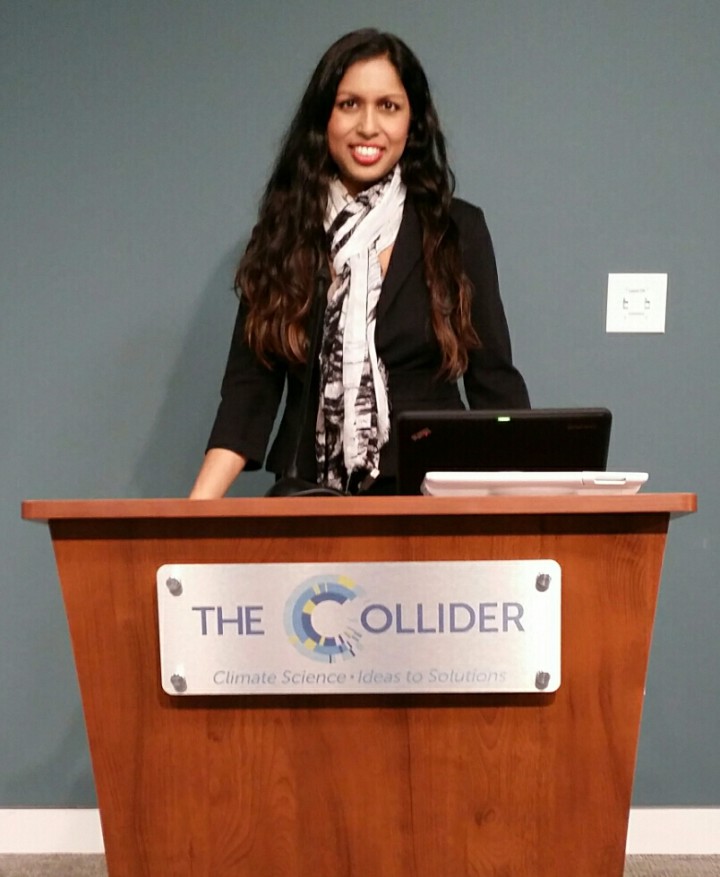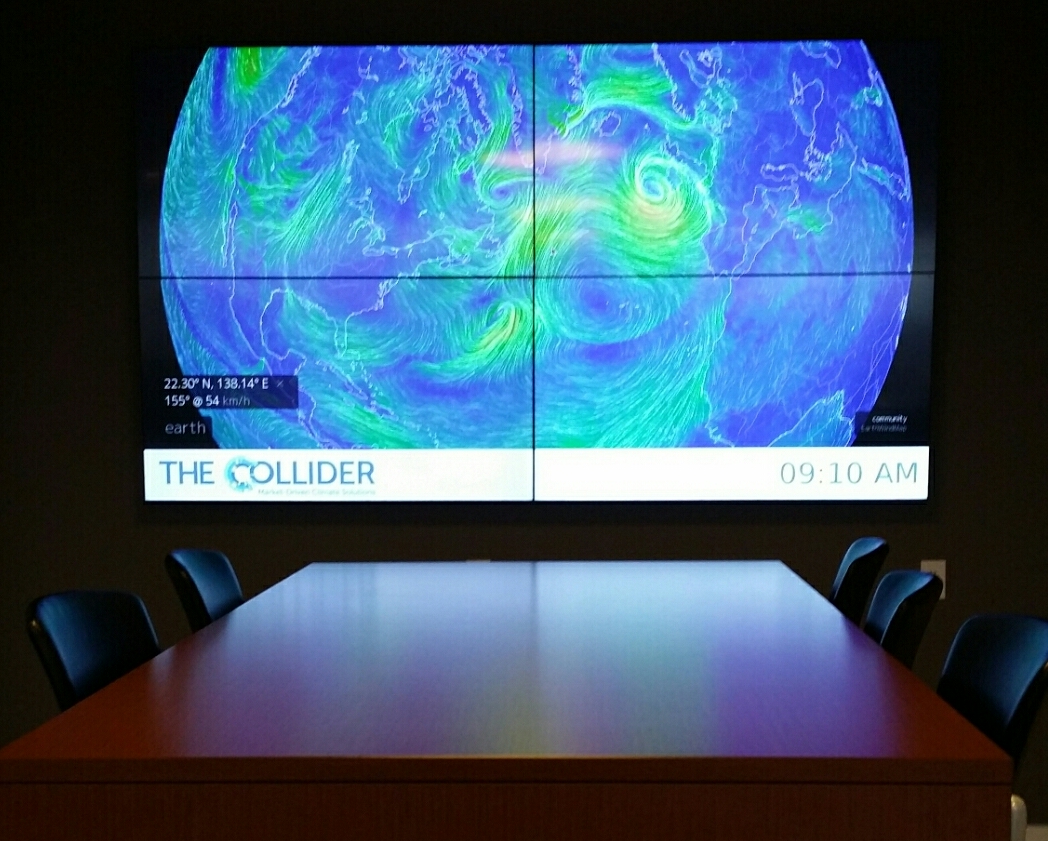Resilience — a take-charge attitude that can help communities deal with the effects of climate change — dominated a forum titled “Climate and Respiratory Health — Focus Asthma” at The Collider on Nov. 9, when Jim Fox, director of the National Environmental Modeling and Analysis Center at UNC Asheville, expounded on preparing for new realities.
“How do you set up your community, yourself, to be able to handle those changing realities? That’s what resilience is all about,” Fox said. “We are dealing with a changing climate. That train has left the station, and we have to adapt. If you have asthma or some other respiratory condition, the world is not going to be a prettier place for you. What if something happens and you have an asthma attack? Are you prepared for that?” Fox and other participants in the forum used a combination of storytelling and data interpretation to foster climate resilience.
The Collider, a nonprofit climate solution center in Asheville, invited entrepreneurs, scientists and engineers to join forces and share their research and successes. Kathi Petersen, director of communications at The Collider, notes that Asheville is the epicenter of the world’s largest repository of weather and climate data. “The Collider is a convener and a collaborator. Government, nonprofits, academia and business can ‘collide’ here to develop world-class climate solutions. Our professional and organizational membership collaborates with many partners to produce professional talks, forums and conferences,” she explained.
Some Collider members and partners participating in the respiratory health event were: CASE Consultants International, the National Oceanic and Atmospheric Administration’s National Centers for Environmental Information, Cooperative Institute for Climate Studies-NC, Clean Air Carolina, HEALTHeWeather, StatWeather Institute and UNC Asheville’s National Environmental Modeling and Analysis Center.
Climate change has been on a murderous rampage of late. In 2017 alone (through Oct. 6), hurricanes, drought, wildfires, freezes, severe storms, tropical cyclones and floods of unprecedented power took 282 lives and caused damage in the billions in the U.S., inflicting severe economic consequences on the areas affected.
Fox recalls the fire that took out Gatlinburg, Tenn., on Nov. 28, 2016, in which 14 people died. “People in Gatlinburg only had one way in and out, and that was cut off by fire,” Fox says. “Most of those people’s homes were not fire-safe. They tried to stay, their homes caught fire, and they died in their homes.” After that happened, Fox says 250 people showed up at The Collider, asking if that could happen in Asheville. “Yes, it could happen here,” he told them.
Eric Klos, CEO of HEALTHeWeather who worked in health information technology for 25 years, says he conceived the idea of his climate startup from his sister, who has rheumatoid arthritis. Suffering from a flare-up, she told him he should develop an app that would tell her when her arthritis was going to be active due to weather changes. “When the light bulb went off in my head about two years ago, I started looking at environmental factors as a determinant of health,” he notes.
Klos says he cemented his focus on asthma after reading an article that described how dangerous asthma is and how quickly it can change lives. According to the article, Diamond Conway, 15, and a resident of Omaha, Neb., used an inhaler to thwart her asthma symptoms, but on July 1, during an annual family vacation in Des Moines, Iowa, she had a severe asthma attack and stopped breathing in a hot tub. She is still in an intensive care unit. Noticing the family’s GoFundMe page, Klos went to the page and typed in “asthma tragedy.”
“I came up with over 150 individual GoFundMe sites related to asthma tragedies,” he says. “What was really depressing was that many of them were not raising funds for medical expenses. They were raising funds for funeral expenses. And these are people in the prime of their lives — 27-year-old, young professional woman has an asthma attack and dies. That got me very much engaged on a personal level.”
At his sister’s suggestion, Klos set about designing an app, with CASE Consultants International working alongside him at The Collider. CASE provided Klos with evidence-based data about asthma exacerbation, which he used to create his Daily Breath risk index. Each day, the Daily Breath delivers an individual risk index to its users. “As we develop more flare-up information from the patients themselves, it can ultimately be refined,” Klos says. It will tell users what will cause problems that day and advise them to have their inhaler, or even a breathing mask, at the ready, he explains. The app also has a map reflecting the information the user has entered, such as where in the community and what time of day the flare-up occurred.
“We’re going to start crowdsourcing flare-ups in a community. You’ll be able to look at those maps within a 10-mile radius over the last four hours, and you’ll be able to see where other people are experiencing flare-ups,” Klos explains.
Calvin Cupini, Clean Air Carolina‘s citizen science program manager, says he believes that the future is directly tied to people outside his organization who assist in the collection of data. He likens the process to the Audubon Bird Society’s Christmas bird count. “There’s no way that the Audubon Society would be able to keep track of as many bird species and their migration patterns, changes in populations and their spatial variance without people writing them a letter every Christmas to let them know what birds they saw and how many of them they saw,” Cupini says. “It crowdsources some of the data, but it also gets the people directly connected to what is being studied. And that is citizen science.”
Clean Air Carolina uses stationary monitors to collect data, but it also equips students with GPS-enabled mobile monitors to check changing air quality in a variety of locations. “We have students that take them where the buses are lined up outside of schools, and we’ve run them through hospital campuses near the helipad. You can take a snapshot of air quality across certain space, which is a more hands-on approach,” Cupini says.

StatWeather, an award-winning weather and climate modeling and predicting company, focuses its work on resilience. Ria Persad, CEO of StatWeather, says she wants people to use her company to discover what’s coming and plan ahead. “It’s not at all the kind of methodology that you’ll get through government models, where they’re measuring the current conditions of the atmosphere in order to propagate forward,” Persad says. “We’re looking at long patterns of history. It’s a machine-ranked system, so it’s learning more recent climate change, applying that and predicting the likelihood of other patterns to evolve.”
Persad’s asthma cost her a normal childhood. “On a scale from zero to 10, my suffering was a 10. Numerous hospitalizations. I stopped breathing in the middle of the night, and my mother had to stay up to make sure I didn’t die,” she recalls.
At the time Persad lived in the San Bernardino Valley near Los Angeles, and she says the smog added to her problems. But moving to Boston, where the cold weather weakened her immune system and caused her to be constantly sick, wasn’t a better solution. It took until adulthood, when her immune system became stronger and she made dietary and exercise improvements, that her asthma symptoms ceased.
Persad’s company has created a tool for people to plan for severe weather. “We’re going to tell you not just a forecast — we’re going out longer,” she says. “We’re also going to show you a statistic on how accurate that forecast is. You can also use this forecast a couple of months out to see if there’s trending for a cold snap or a big heat wave.”
Cupini discusses the many ways climate work can help people and localities become climate-resilient. “If we accept that there is a certain amount of carbon in the atmosphere, what can we do about it?” he asks. “Everything from hydrological engineering in Venice to keep the city from sinking, along with monitoring networks like mine for tracking pollen, which increases as climate change continues. We will need ways of tracking and identifying the effects of wildfires due to increased droughts,” he points out. “There will be a thousand different ways that all of these are impacted by the change of climate, which means there will need to be a thousand different solutions. And that’s where people should feel some confidence and find that spirit to get involved.”






Dear Jameson O’Hanlon,
I read with interest your article on our forum Climate and Respiratory Health – Focus Asthma.
May I please ask you to correct the name of my company – CASE Consultants International. The link you provide correctly points to the CASE’s home web page.
CASE associates consult in climate change impacts and adaptation. CASE focuses our climate arts & sciences expertise in areas of society that are sensitive to our changing climate. As part of its education mission, CASE mainstreams climate science into the practices of those professions which may be sensitive to climate, through a series of workshops. This particular workshop is the latest in a series that CASE has offered, some of which have been at The Collider.
CASE initiated, planned, produced, publicized, executed, and paid for the climate and respiratory health workshop. The Focus Asthma workshop was convened with the sponsorship of Clean Air Carolina. We were very grateful to our sponsors and Collaborators, especially NOAA Cooperative Institute for Climate and Satellites. The Collider rented space to CASE for the morning session of the workshop. NEMAC, which developed the Climate Resilient Toolkit, which was presented along with the other talks you highlighted in your article, hosted the afternoon session.
The details of this particular workshop, and other recent workshops are on our event page here http://www.caseconsultantsinternational.com/events.html
Sincerely,
Marjorie McGuirk
President
CASE Consultants International
Thank you, Ms. McGuirk. We have made the change you requested.